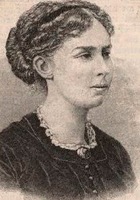Augusta Davies Webster
Augusta Davies Webster Poems
Birds sing "I love you, love" the whole day through,
And not another song can they sing right;
But, singing done with, loving's done with quite,
The autumn sunders every twittering two.
...
Poor little diary, with its simple thoughts,
its good resolves, its "Studied French an hour,"
"Read Modern History," "Trimmed up my grey hat,"
"Darned stockings," "Tatted," "Practised my new song,"
...
Dead is he? Yes, our stranger guest said dead--
said it by noonday, when it seemed a thing
most natural and so indifferent
as if the tale ran that a while ago
...
Young laughters, and my music! Aye till now
The voice can reach no blending minors near;
'Tis the bird's trill because the spring is here
And spring means trilling on a blossomy bough;
...
TOO rash, sweet birds, spring is not spring;
Sharp winds are fell in east and north;
Late blossoms die for peeping forth; Rains numb, frost
...
(The Doubter lays aside his book.)
"Answered a score of times." Oh, looked for teacher,
is this all you will teach me? I in the dark
...
Not yet!
I thought this time 'twas done at last,
the workings perfected, the life in it;
...
The sun drops luridly into the west;
darkness has raised her arms to draw him down
before the time, not waiting as of wont
till he has come to her behind the sea;
...
A bird and flower upon the tree,
Sweet peony and oriole,
Each of them a perfect soul,
...
DAY is dead, and let us sleep,
Sleep a while or sleep for aye,
'Twere the best if we unknew
...
FAREWELL: we two shall still meet day by day,
Live side by side;
But never more shall heart respond to heart.
...
DEAR love, good-night. And, tender sleep
,Seal up her lids like these drowsed flowers,
To make day fair when they unclose.
...
SOFT voices of the woods, that make
The summer air a harmony,
Winged whispers through the leaves where wake
Long wind-wafts dying in a sigh,
...
Alas, I thought this forest must be true,
And would not change because of my changed eyes;
...
A week ago; only a little week:
it seems so much much longer, though that day
is every morning still my yesterday;
as all my life 'twill be my yesterday,
...
SOME quick kind tears, some easy sorrow,
And then 'tis past.
'Twas sad; yet sadness has its morrow;
...
WHITE rose sighed in the morn,
Red rose laughed in the noon,
And 'Sweetest sweetness is ended soon,'
And 'Never heed for the thorn.'
...
No, mother, I am not sad:
Why think me sad? I was always still,
You remember, even when my heart was most glad
And you used to let me dream at my will;
...
IN the world was one green nook I knew,
Full of roses, roses red and white,
Reddest roses summer ever grew,
...
Augusta Davies Webster Biography
Born in 1837, Webster was a prolific writer in every genre, a self-educated classical scholar, a professional poetry reviewer, an activist, and an educator. She began her literary career as a young girl and had published two volumes of poetry, two well-received translations of Aeschylus and Euripides, and a three-volume novel by the time she became a very active member of the London Suffrage Society in the 1860s. During the 1870s Webster continued to support suffrage for women and the women’s movement in general, as well as liberalism and individualism, in a series of essays that she wrote for the Examiner and later published as A Housewife’s Opinions. Beginning in 1879, she served two terms on the London School Board, with the second term concurrent with her position as one of the main poetry reviewers for the Athenaeum. She consistently published poetry and drama in these years, as well as a children’s novella. Webster was married and had one daughter. In the 1880s she hosted literary salons and was one of the most respected literary, political, and social figures in London until she died of cancer in 1894. Webster disappeared from view immediately after her death, and critics are only now beginning the process of exploring the rich diversity of her work. The recent increased interest in Julia Augusta Webster bodes well for a more complete understanding of the significance of Webster’s work as a writer and professional critic, as well as her effectiveness as an activist and political figure. However, as this bibliographic project demonstrates, relatively few scholars have focused on the work of this woman of significance in the last half of the 19th century. Biography The only biographically focused work to date is Patricia Rigg’s book. Rigg 2009 makes use of archived letters and family records in the United Kingdom and the United States to construct as comprehensive an account of Webster’s early family connections, marriage, motherhood, activism, and professional reviewing work as archival materials allow.)
The Best Poem Of Augusta Davies Webster
Birds Sing I Love You, Love
Birds sing "I love you, love" the whole day through,
And not another song can they sing right;
But, singing done with, loving's done with quite,
The autumn sunders every twittering two.
And I'd not have love make too much ado
With sweet parades of fondness and delight,
Lest iterant wont should make caresses trite,
Love-names mere cuckoo ousters of the true.
Oh heart can hear heart's sense in senseless nought,
And heart that's sure of heart has little speech.
What shall it tell? The other knows its thought.
What shall one doubt or question or beseech
Who is assured and knows and, unbesought,
Possesses the dear trust that each gives each.
Augusta Davies Webster Comments
can I copy the photo of Augusta Webster for my forthcoming book on Votes fpor Women in Cambridge?

A wonderful poetess of past century.